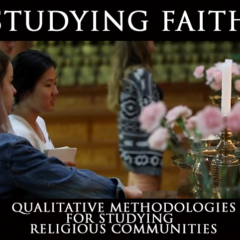Getting Started
At first, there may be some apprehension on the part of both the interviewer and interviewee. On the one hand, as an interviewer, you may be concerned that the person being interviewed might not be an appropriate research subject or may not be open to your line of questions. This is normal. Sometimes you will have great interviews, rich with significant and detailed data, and at other times you might not get what you hoped for.
Regardless of your concerns, your job is to make the interview as fruitful as possible. The person being interviewed may not be clear on the purpose or intent of the meeting and your questions. It is always helpful to restate the research project and its general objective. Specify to them your interests and questions, and explain why you chose them to interview. Tell the interviewee that you are trying to learn from them about their participation in their religious group or practice. Ask them if they have any preliminary questions for you before you get started.
Talking But Also Listening
Interviewing is a skill that requires you as the interviewer to talk and most importantly to listen and ask further questions. Talking is essential because it helps build rapport, a necessary part of building trust between you and your interviewee, but you also have to listen, always showing interest in what your interview subjects are saying. Here are some tips:
- Sometimes it’s useful to let your interviewee interrupt you, as this may lead to important insights.
- Sometimes it is useful to be quiet and become comfortable with awkward silences or long pauses. This could be a cultural form of communication, and it also gives the interviewee the opportunity to reflect deeper about their experiences.
- Avoid positive or negative feedback to responses the interviewee gives. Use neutral phrases like “that’s interesting” instead. It also builds rapport when you affirm the emotional content of what your respondent is saying, such as “wow, that sounds hard” or “that must have been encouraging.”
- Tangents in the conversations can sometimes be the most meaningful part of an interview, so you do not always need to resist them. At the same time, know when guidance is necessary. If you have a limited time for an interview, be sure that tangents do not prevent you from getting all your questions answered.
Nalika Gajaweera was a senior research analyst with the USC Center for Religion and Civic Culture through 2023.
Andrew Johnson is a contributing fellow with the USC Center for Religion and Civic Culture.

